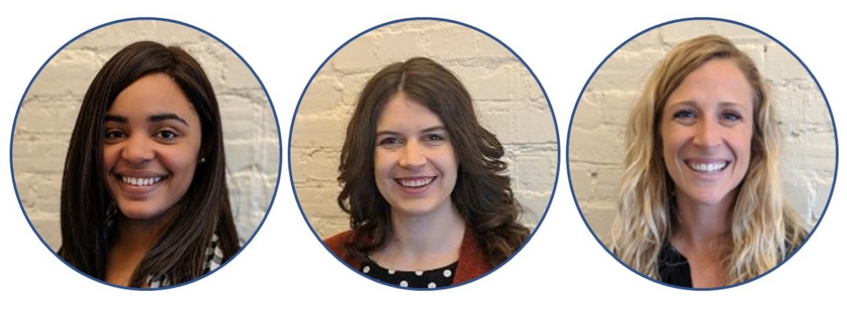Hello! We are Carolina De La Rosa Mateo, Audrey Hanson, and Lindsay Anderson, three of the newest additions at Professional Data Analysts (PDA), a public health evaluation firm based in Minneapolis, MN. As new evaluators (two fresh out of MPH programs, one PhD candidate), we will share insight into how graduate programs have prepared us to work in the field of evaluation thereby renewing the workforce of evaluators.

The University Community
We are fortunate that the Twin Cities area has strong roots in evaluation, and it has strongly contributed to our desire to work in the field. The University of Minnesota is one of the few universities that offers a doctoral program in evaluation studies and thanks to the work of Jean A. King, Michael Q. Patton, and others, the program has grown evaluation capacity in the region. The university also offers a minor in Evaluation Studies, training through the Minnesota Evaluation Studies Institute (MESI) and a rich network of professors and alumni that engage with these programs encouraging us to continue to learn and find opportunities for practical experience. A healthy combination of support from professors who are leaders in the field, collaboration with other students, and field experiences have prepared us for working in evaluation.
The Classroom Experience
Having experienced some formal education in evaluation, we can reflect on what has been most helpful from the classroom setting. One area is learning the language of evaluation and foundational concepts that comprise the evaluation process. Our educational backgrounds emphasized the specific steps involved in the process of an evaluation (planning and design, data collection, analysis, and reporting), with a noticeable emphasis on research methods and understanding the theories behind different inquiry strategies. This understanding of what makes up an evaluation is critical to our success as evaluators.
In recognizing the strengths of our education, we also acknowledge the gaps or missing concepts that would have been beneficial. Among these, how to build and maintain relationships with anyone involved in the evaluation (clients, stakeholders, etc.), how to write for non-academic audiences, and how to pick from a variety of dissemination products to fit the needs of your audience.
Beyond the Classroom
Working in evaluation has allowed us to learn experientially and fill-in some of the knowledge gaps that just can’t be fully explored in the classroom. For starters, the real world is complicated and there are many factors that can impact evaluation. In practice, you must be able to interpret complex systems and adapt to meet clients where they are, which brings us to the importance of compromise and negotiation. Often the ‘perfect’ evaluation plan is neither practical nor feasible. Finding ways to compromise and negotiate with clients to do the best with what you have is crucial. Finally, evaluation is impossible without relationships. Taking time to build and maintain relationships with clients as well as other evaluators will strengthen not only evaluation work but your professional network, too.
“Evaluation is impossible without relationships. Take the time to build and maintain relationships – for the success of the evaluation and for your professional network.”
Carolina De La Rosa Mateo, Audrey Hanson, Lindsay Anderson
The American Evaluation Association is celebrating Contribution, Leadership, and Renewal Week where a group of Minnesota-based evaluators reflect on the theme of Evaluation 2019, to be held in Minneapolis, MN. Do you have questions, concerns, kudos, or content to extend this aea365 contribution? Please add them in the comments section for this post on the aea365 webpage so that we may enrich our community of practice. Would you like to submit an aea365 Tip? Please send a note of interest to aea365@eval.org. aea365 is sponsored by the American Evaluation Association and provides a Tip-a-Day by and for evaluators.
